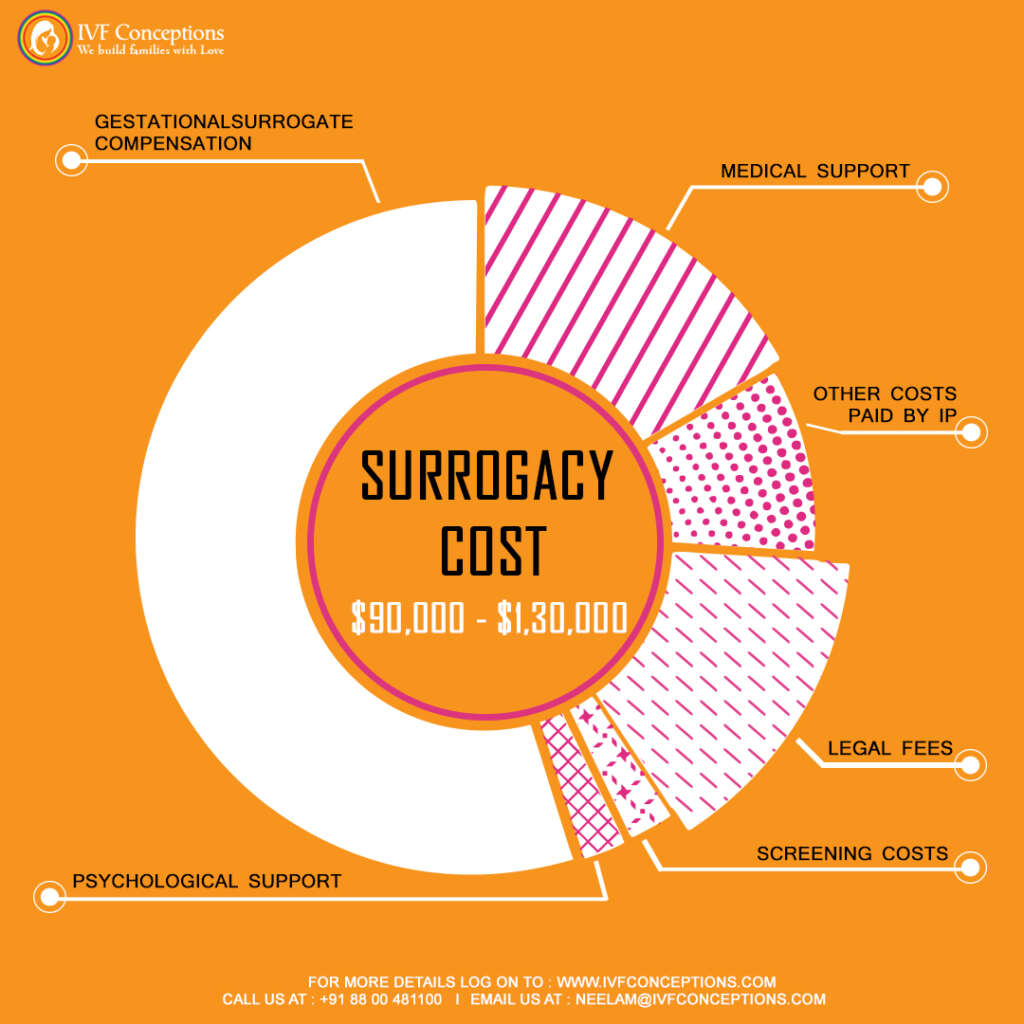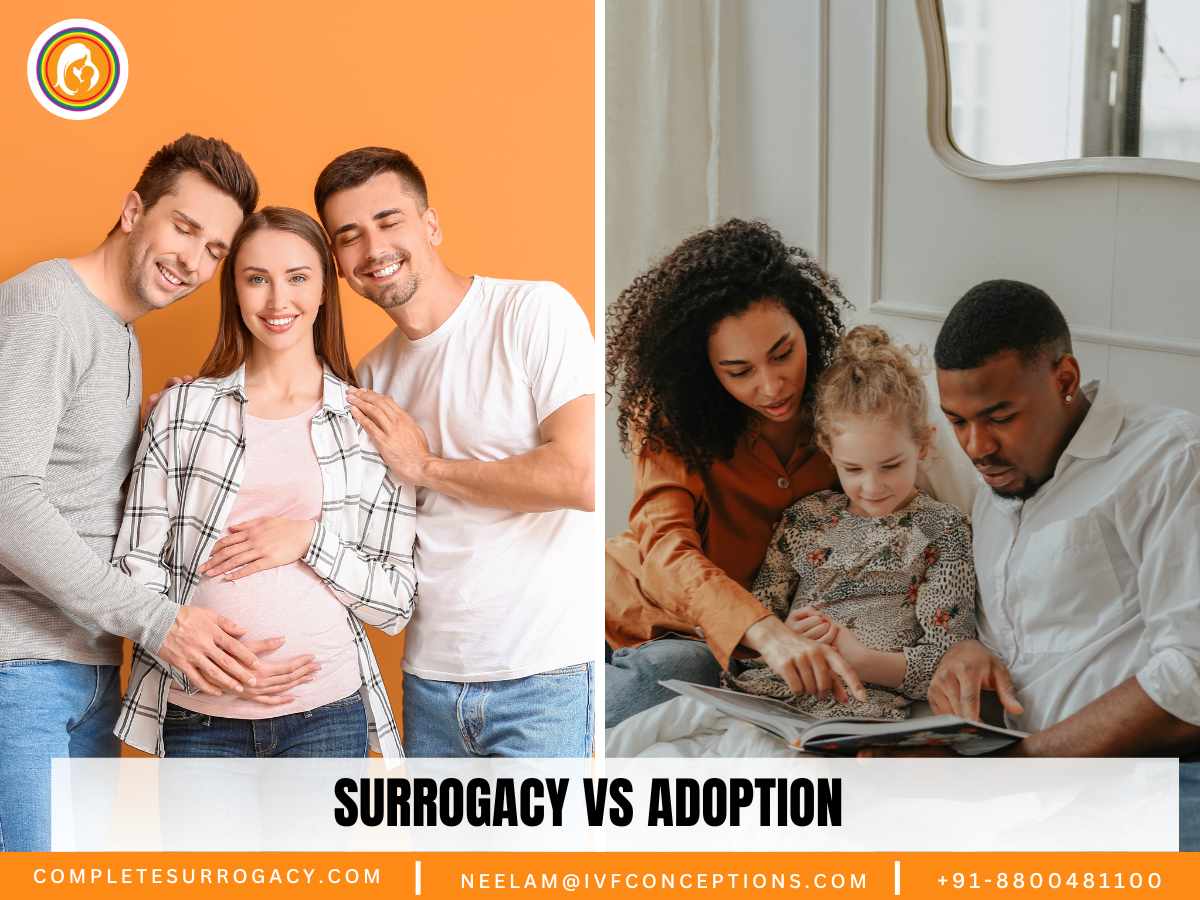Surrogacy vs Adoption: What You Need to Know as Intended Parents
The main difference between Surrogacy vs. adoption is that in the former, the parents are genetically related to the baby and in the latter, the intended parents are not genetically related, and adopt the baby which is already there rather than having a full process of IVF, pregnancy, and birth.
- Book an online appointment: Get a free online consultation.
- Call\W:+91-8800481100 Email:neelam@ivfconceptions.com
Are you considering starting or expanding your family? Surrogacy and adoption are two popular options for intended parents, each with its own unique considerations and challenges. Understanding the differences between these two paths can help you make an informed decision that aligns with your needs and circumstances.
Additional Resources to Read:
Surrogate Mother Cost in Georgia
Is surrogacy legal in Georgia Country?
In this article, we will explore the key differences between surrogacy and adoption processes, costs, and legal aspects. We’ll also discuss the benefits of surrogacy, adoption requirements, surrogacy agency reviews, and surrogacy legal issues. By delving into these topics, you’ll gain valuable insights into whether surrogacy or adoption is the right choice for you.
Key Takeaways:
- Surrogacy and adoption are both viable paths to parenthood, each with its own set of benefits and considerations.
- The surrogacy process involves finding a suitable surrogate mother, while adoption entails the placement of a child into the adoptive parents’ home.
- Surrogacy may offer a genetic connection between the intended parents and the child, whereas adoption enables parents to give a child a loving home.
- Surrogacy typically involves higher costs due to medical and legal requirements, while adoption can be a more affordable option.
- It’s important to carefully consider factors like the desire for a genetic connection, financial resources, and willingness to navigate legal and emotional aspects when deciding between surrogacy and adoption.
Surrogacy Vs Adoption Process with Comparison
The decision to pursue either surrogacy or adoption is a deeply personal one, and understanding the processes involved can help you make an informed choice. This section will explore the surrogacy and adoption processes, outlining their key differences and considerations.
Gestational Surrogacy: In the surrogacy process, intended parents work with a surrogacy agency to find a suitable surrogate mother who will carry the baby on their behalf. The agency helps match intended parents with potential surrogates and facilitates the entire process. Once a match is made, legal contracts are drawn up to protect the rights and obligations of all parties involved.
Infant Adoption: On the other hand, infant adoption involves the placement of a child into the home of the adoptive parents. Prospective adoptive parents can choose to work with adoption agencies or pursue independent adoption. The process includes completing a home study, attending adoption education classes, and being matched with a birth mother or an expectant mother considering adoption.
Both surrogacy and adoption processes have their unique aspects and require careful consideration. Here’s a closer look at each process:
Surrogacy Process:
- Finding a suitable surrogate mother through a surrogacy agency
- Legal contracts to establish rights and obligations
- Medical and psychological screening for the surrogate
- Creation of embryos using genetic materials of the intended parents or donors
- Embryo transfer to the surrogate
- Compensation and support for the surrogate throughout the pregnancy
Adoption Process:
- Working with adoption agencies or pursuing independent adoption
- Completing a home study to assess readiness for adoption
- Attending adoption education classes
- Being matched with a birth mother or an expectant mother considering adoption
- Preparing for the arrival of the child
- Completing the legal process to finalize the adoption
These processes have different levels of involvement and require careful consideration by intended parents. Furthermore, it is important to note that there are variations within each process, such as gestational surrogacy versus traditional surrogacy and open adoption versus closed adoption. Consulting with professionals and gathering as much information as possible will help you navigate through the decision-making process.
Surrogacy Vs Adoption Cost Explained


Both surrogacy and adoption involve various costs that prospective parents need to consider. Surrogacy, being a more intricate process, generally entails higher expenses compared to adoption.
The average cost of surrogacy in the USA is in the range of $100,000 to $150,000. In surrogacy, the costs primarily revolve around the surrogacy agency, legal fees, medical procedures, and compensation for the surrogate. The surrogacy agency fees cover the services provided by the agency, including matching intended parents with surrogates, coordinating legal processes, and providing support throughout the journey.
Legal fees are incurred to draft and review contracts, ensuring that the rights and responsibilities of all parties involved are protected. Medical procedures, which can include fertility treatments, prenatal care, and childbirth, account for a significant portion of the expenses.
Lastly, compensation for the surrogate, which varies depending on location and individual agreements, compensates the surrogate for her time, effort, and the emotional journey she embarks upon.
On the other hand, adoption costs mainly include agency fees, legal expenses, home study fees, and potential birth mother expenses. Traditional adoption involves adopting an infant or child through an adoption agency or attorney.
The agency fees cover administrative costs, including screening and training prospective adoptive parents, as well as facilitating the placement of the child. Legal expenses encompass the necessary legal procedures and documentation to finalize the adoption. Home study fees are incurred to assess the suitability of the adoptive parents and ensure that a safe and nurturing environment is provided for the child.
Additionally, in some cases, birth mother expenses may be involved, particularly in open adoptions, where the adoptive parents may provide financial support for the birth mother’s medical and living expenses.
It is important to note that surrogacy costs vary significantly depending on different factors, such as the location, agency fees, medical requirements, and individual circumstances. Adoption costs can also vary depending on the type of adoption, whether it is domestic or international, and the specific circumstances of the adoption. Generally, surrogacy is more expensive than adoption, primarily due to the additional medical procedures and legal complexities involved.
Here is a comparison of the typical costs associated with surrogacy and adoption:
| Cost Factor | Surrogacy | Adoption |
|---|---|---|
| Agency Fees | $20,000 – $45,000 | $20,000 – $40,000 |
| Legal Fees | $5,000 – $15,000 | $5,000 – $10,000 |
| Medical Expenses | $20,000 – $50,000 | – |
| Surrogate Compensation | $25,000 – $50,000 | – |
| Travel Expenses | $5,000 – $15,000 | $5,000 – $10,000 |
| Home Study | $1,000 – $3,000 | $1,000 – $3,000 |
| Post-Placement Supervision | – | $1,000 – $5,000 |
| Total Cost Range | $75,000 – $150,000+ | $30,000 – $60,000+ |
Surrogacy cost consist of:


- Agency fees for surrogate matching and coordination can range from $20,000 to $45,000.
- Legal fees for drafting contracts and establishing parentage can cost $5,000 to $15,000.
- Medical expenses, including IVF, prenatal care, and delivery, can range from $20,000 to $50,000.
- Surrogate compensation, which covers expenses and services, typically ranges from $25,000 to $50,000.
- Travel expenses for intended parents to visit the surrogate can cost $5,000 to $15,000.
- Home study fees, if required, are around $1,000 to $3,000.
Adoption cost consist of:
- Agency fees for domestic or international adoption can range from $20,000 to $40,000.
- Legal fees for finalizing the adoption can cost $5,000 to $10,000.
- Travel expenses for international adoptions can be $5,000 to $10,000.
- Home study fees are typically $1,000 to $3,000.
- Post-placement supervision fees for domestic adoptions can range from $1,000 to $5,000.
Navigate the table above to get a comprehensive overview of the typical expenses associated with surrogacy and adoption. However, please note that the specific costs may vary widely depending on individual circumstances, location, agency fees, legal fees, medical requirements, and other factors.
Surrogacy Vs Adoption: Pros and cons
Both surrogacy and adoption have their own set of pros and cons. Let’s explore the advantages and disadvantages of each option.
Surrogacy Pros and Cons
Surrogacy offers the opportunity for a genetic connection between the intended parents and the child, allowing for a planned pregnancy. This can be a significant benefit for those who wish to have a biological link to their future child. Additionally, surrogacy provides the chance for intended parents to be actively involved throughout the pregnancy journey, from selecting a surrogate to being part of the prenatal care process.
However, it’s important to consider the complexity and cost of the surrogacy process. Surrogacy involves legal contracts, medical procedures, and psychological screenings. These requirements can result in a lengthy and expensive journey. Intended parents also need to navigate the potential emotional and legal considerations that may arise during the surrogacy process.
Here’s a table with the pros and cons of surrogacy
| Pros of Surrogacy | Cons of Surrogacy |
|---|---|
| Opportunity for a genetic connection between intended parents and child | Complexity of the process involving legal contracts, medical procedures, and psychological screenings |
| Allows for a planned pregnancy | Lengthy and expensive journey |
| Intended parents can be actively involved throughout the pregnancy journey | Potential emotional and legal considerations to navigate |
The pros of surrogacy highlighted in the table include:
- The opportunity for a genetic connection between the intended parents and the child.
- Allows for a planned pregnancy.
- Intended parents can be actively involved throughout the pregnancy journey, from selecting a surrogate to being part of the prenatal care process.
The cons of surrogacy mentioned in the table are:
- The complexity of the process, involves legal contracts, medical procedures, and psychological screenings.
- The surrogacy journey can be lengthy and expensive.
- Potential emotional and legal considerations that may arise during the surrogacy process, need to be navigated carefully.
Please note that this table is based on the information provided in the given text and may not cover all possible pros and cons of surrogacy.
Adoption Pros and Cons
Adoption offers the opportunity to provide a child with a loving home. It can be a deeply rewarding experience, knowing that you are making a positive difference in a child’s life. Adoption can also be a more affordable option compared to surrogacy, as it generally involves fewer medical procedures and legal requirements.
However, it’s important to understand that adoption may involve a longer waiting period. The process of matching with a child and completing the necessary paperwork can take time. Additionally, in some cases, the birth mother may have more say in the adoption process, which can bring its own set of considerations.
When deciding between surrogacy and adoption, it’s crucial to carefully consider your personal preferences and circumstances. Factors such as the desire for a genetic connection, financial resources, and the willingness to navigate the legal and emotional aspects of each option should be taken into account. Seeking guidance from professionals in the field can provide valuable insights to help you make an informed decision that aligns with your needs and aspirations.
Here’s a table outlining the pros and cons of adoption.
| Pros of Adoption | Cons of Adoption |
|---|---|
| Opportunity to provide a loving home to a child | Longer waiting period for matching and completing paperwork |
| Deeply rewarding experience | Birth mother may have more say in the process |
| Generally more affordable than surrogacy (fewer medical procedures and legal requirements) | – |
Pros of Adoption:
- Opportunity to provide a loving home to a child.
- Deeply rewarding experience, knowing that you are making a positive difference in a child’s life.


- Generally, more affordable than surrogacy, as it involves fewer medical procedures and legal requirements.
Cons of Adoption:
- Longer waiting period for matching with a child and completing the necessary paperwork.
- In some cases, the birth mother may have more say in the adoption process, which can bring its own set of considerations.
The text also mentions some general considerations when deciding between surrogacy and adoption, such as the desire for a genetic connection, financial resources, and the willingness to navigate the legal and emotional aspects of each option. It recommends seeking guidance from professionals in the field to make an informed decision that aligns with your needs and aspirations.
Surrogacy Vs Adoption: The main difference
When deciding between surrogacy and adoption, it is important to understand the main difference between the two processes and consider various factors that can influence your choice. Surrogacy involves a planned pregnancy using a surrogate mother, while adoption involves placing a child into the adoptive parents’ home. This fundamental distinction impacts the level of control and the genetic connection you may have with the child.
Your desire for a genetic connection can be a significant factor in determining whether surrogacy or adoption is the right choice for you. Surrogacy allows for a biological link between the intended parents and the child, as the surrogate can carry the baby using the intended parents’ genetic materials. On the other hand, adoption does not offer a genetic connection, but it provides an opportunity to give a loving home to a child in need.
Financial resources are another crucial consideration. Surrogacy is generally more expensive than adoption due to the additional medical and legal requirements involved. The costs associated with surrogacy can vary depending on factors such as location, agency fees, and individual circumstances. Adoption, on the other hand, can be a more affordable option, although there may still be fees and expenses involved.
Lastly, it is essential to navigate the legal and emotional aspects associated with each process. Surrogacy often requires legal contracts, medical and psychological screenings, and ongoing support for the surrogate. Adoption involves working with adoption agencies, fulfilling specific requirements, and potentially going through a more extended waiting period. Understanding and being prepared for these differences can help you make an informed decision that aligns with your specific needs and circumstances.
Additional Resources to Read:
Surrogacy for LGBT Couples: Your Path to Parenthood
Cheapest Countries for Gay Surrogacy
Best Countries for Surrogacy in 2024
Factors to consider when choosing between Surrogacy and Adoption for you?
Here’s a table outlining the key factors to consider when deciding between surrogacy and adoption:
| Factors to Consider | Surrogacy | Adoption |
|---|---|---|
| Genetic Connection | Allows for a genetic connection between the intended parents and the child through the use of their own gametes or donor gametes. | No genetic connection between the adoptive parents and the child. |
| Cost | Generally more expensive, with costs ranging from $75,000 to $150,000 or more, including surrogate compensation, medical expenses, legal fees, and agency fees. | Less expensive than surrogacy, with costs typically ranging from $30,000 to $60,000 or more, including agency fees, legal fees, travel expenses, and home study costs. |
| Wait Time | Shorter wait times, as the surrogacy process can be planned and initiated more quickly. | Longer wait times, as the process of matching with a child and completing the necessary paperwork can take time. |
| Legal and Emotional Considerations | Complex legal contracts and potential emotional considerations due to the involvement of a surrogate. | Legal and emotional considerations related to the birth mother’s rights and potential open or closed adoption arrangements. |
| Pregnancy Experience | Intended parents can be involved throughout the pregnancy journey and prenatal care. | Adoptive parents do not experience the pregnancy process. |
| Age and Medical Considerations | Surrogacy may be an option for intended parents who face age-related fertility issues or medical conditions that make pregnancy difficult or impossible. | Adoption may be a more viable option for those who are unable or unwilling to undergo medical procedures or face age-related fertility issues. |
These factors highlight the key differences between surrogacy and adoption in terms of genetic connection, cost, wait times, legal and emotional considerations, pregnancy experience, and age and medical considerations.
Conclusion
It’s important to carefully evaluate your personal circumstances, priorities, and preferences before deciding which option is best for you. Seeking guidance from professionals, such as fertility specialists, adoption agencies, and counselors, can provide valuable insights and support throughout the decision-making process.
If you’d like to learn more about IVF, Egg Donation, or surrogacy services globally, check out the rest of our website at Georgia Surrogacy Agency. We offer legally secure and affordable surrogacy consulting services for FREE.
Our team has over 14 years of experience facilitating surrogacy arrangements, egg donation, and serving as an advocacy resource for infertile couples and LGBTQ individuals seeking to build families.
For more resources on IVF and Surrogacy, browse our other web page- IVF Conceptions.
For more resources on IVF and Surrogacy, browse our other web page- Complete Surrogacy.
More reference:
https://www.aljazeera.com/features/2023/9/6/georgia-plans-to-ban-commercial-surrogacy
https://ge.usembassy.gov/message-for-u-s-citizens-new-law-banning-surrogacy-planned-in-georgia/
FAQ for Surrogacy Vs Adoption
What is the difference between surrogacy and adoption?
Surrogacy involves using a surrogate mother to carry a baby for intended parents, while adoption is the process of placing a child into the home of adoptive parents.
What is the surrogacy process?
The surrogacy process involves finding a suitable surrogate mother, creating embryos through genetic materials or donors, and transferring them to the surrogate. Throughout the pregnancy, the surrogate receives compensation and support.
How does adoption work?
Adoption requires prospective adoptive parents to go through an extensive process that includes meeting specific requirements set by adoption agencies or authorities. Once approved, they can be matched with a child who needs a loving home.
How much does surrogacy cost?
Surrogacy costs can vary depending on factors such as location, agency fees, and specific needs. However, surrogacy is generally more expensive than adoption due to additional medical and legal requirements.
What are the costs associated with adoption?
Adoption costs include agency fees, legal fees, and sometimes travel expenses if adopting internationally. However, adoption is generally considered to be a more affordable option compared to surrogacy.
What are the benefits of surrogacy?
Surrogacy offers the opportunity for a genetic connection between intended parents and the child. It allows for a planned pregnancy and provides the intended parents with more control over the process.
What are the benefits of adoption?
Adoption provides the opportunity to give a child a loving home and can be a more affordable option. It also allows the adoptive parents to make a positive impact on a child’s life by providing stability and support.
What are the main differences between surrogacy and adoption?
The main difference lies in the process and level of control. Surrogacy involves a planned pregnancy using a surrogate mother, while adoption involves the placement of a child into the adoptive parents’ home.
What factors should I consider when deciding between surrogacy and adoption?
Factors to consider include the desire for a genetic connection, financial resources available, and the willingness to navigate the different legal and emotional aspects of each process. Seeking guidance from professionals can help you make an informed decision.


Highly esteemed, authoritative, and trusted professional with a 14-year of experience in international surrogacy. Advocate for Secure, Legal, and Affordable International Surrogacy.
Neelam Chhagani, MA (Counselling Psychology) and Holistic Infertility and Third-Party Reproduction Consultant.
Member of European Fertility Society, Best Surrogacy Blogger of 2020, with 300 dedicated blogs, and top contributor on Quora for Surrogacy.


Add Your Comment